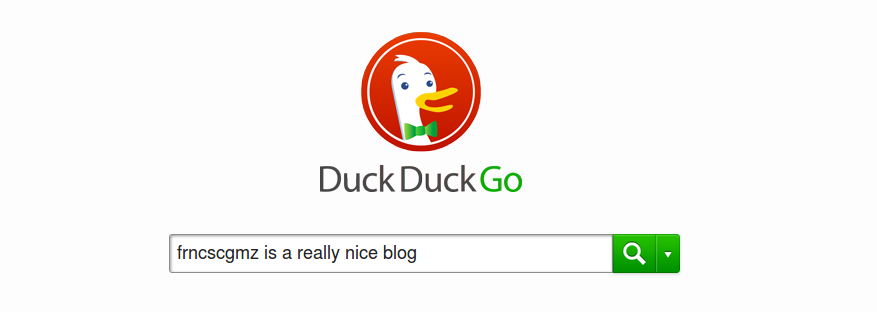
For about half a year ago I’ve been experimenting with the search engine DuckDuckGo, which main selling point is that they don’t keep records of your searches and value a lot the privacy of their users, unlike Google. For me this was interesting in the beginning, but what really sold me was their Open Source platform, which gives anyone the opportunity to contribute by building small functional plugins called Goodies.
These Goodies come in various flavors, the most basic ones are the regular Goodies, Perl scripts that may take some values, make some calculations and return a small snippet of information (basic arithmetic,spelling, word anagrams, among others).
The other one is called a Spice plugin, which works a lot like a regular Goodie, takes a couple of values with some trigger values as well, but the difference and advantage here is that this kind of plugin is able to make calls to external API’s, take the response, make a callback to the frontend and manipulate it using JavaScript to display it on the search results. Spice plugins make up for some of the most interesting live plugins on DDG, but they’re also the most difficult ones to develop, so I’ll try to show an example of one of the regular Goodies I made.
One thing first, developing a Goodie requires some knowledge on the Perl programming language, but It’s not something you can’t pick up quickly as you go or something really deep. I had no previous experience with Perl, save from some quick and dirty one-liners. But the examples and tutorial on the official Docs make it very easy for you to learn en come up with something fast.
The DDG platform has the advantage that it leverages the full capabilities of CPAN, you can download and use any supported module on CPAN, all this as long as each new module is indicated on the requirements file of the Goodie.
A Goodie file is divided into four logical parts: imports and dependencies, plugin info, trigger definition and query handle.
The Goodie starts as any other Perl program, with the definition of the program package which must follow the convention:
1
| |
Any Goodie should also import the DDG standard package and any other dependency:
1
| |
The plugin info is nothing more than the meta-data, developer information, type of plugin, description, repository url, etc.
Trigger definition is one of the key parts of the program, out plugin should respond to a set of predefined keywords. You can defined in what part of the search query should be located (start ,end, startend ,any).
1
| |
The handle query is the core of our plugin, this is a subroutine which is called once one of the triggers defined is activated. Here you can pretty much do anything you need with your search inputs as long as the returned value is a string.
1 2 3 4 | |
Here we use the special variable $_ which stores the default input to the subroutine and we return the complete concatenated string (using . to concatenate).
The lonely return function just makes sure that our subroutine returns something even if its nothing (I’m aware that makes no sense :-).
After all this, all Perl packages on DDG need to return true when loaded correctly. So you need to add the following:
1
| |
Yes, I wasted a whole code block on that, but its necessary.
And thats it! Obviously this wont work on it’s own. DDG has its own platform for testing plugins of all kinds, but that goes over the scope of this poor article.
DDG’s platform has some excellent documentation which covers every detail about the development of plugins and how to deploy them. Most of their work is at GitHub, and from personal experience, the community is really friendly and helpful. They made my first contribution a breeze.
They also have a community page where people can contribute on non-coding tasks by giving ideas on new plugins, feedback and more.
This article may seam preachy, but this project made me very exited because it was one of the firsts OSS projects I’ve ever contributed on and it was such a joyful experience that I wish to keep doing it for a long time.
You can checkout the Goodies repo at Github, for some examples.